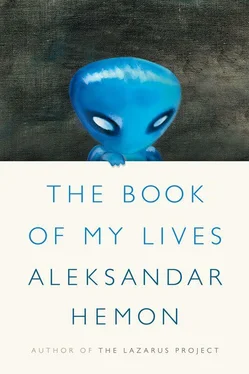I’d retained the habit of showing up early for games, forever tormented by the possibility of not being allowed to join in. Lido lived nearby and was often there before everyone else. Now and then, he’d arrive flustered and annoyed because he’d seen one of our American fellow players hiding in the park, careful to stay away from us in order to avoid the pregame chitchat. What kind of people are they? Lido grumbled. What are they afraid of? Such a thing would never happen in Italy, he said. Lido was originally from Florence and proudly wore a purple Fiorentina jersey. In Italy, he said, people are always happy to talk to you and help you. If you’re lost and ask them for directions, they’re willing to leave their stores and houses unattended to take you where you need to go. And they talk to you nicely, politely, and not like these —and he flung his hand dismissively toward the trees and bushes behind which the shy Americans were cowering. When I asked him how often he went to Italy, he said he didn’t go too often. In Florence, he kept a beautiful Ferrari, he explained, and there were a lot of jealous people there: they would steal his wheels, smash his blinkers, scratch the doors with a nail, for no reason other than sheer malice. He didn’t like to go, he said, because people in Italy are not very nice. When I cautiously reminded him that just a few sentences ago Italians had been incredibly nice, he nodded and exclaimed, Yes, yes, very nice! and I gave up. It seemed that Lido was able to hold in his head two mutually exclusive thoughts without inner conflict — a quality, I realized in a flash, not uncommon among artists.
Lido had come to Chicago in the fifties. In Florence, he and his brother had a business restoring Renaissance frescoes and old paintings, apparently a dime a dozen over there. After they’d arrived in America, they figured there were a lot of paintings in need of restoration over here and they started a business. He’d been doing pretty well since, which allowed him to enjoy life to its full extent. He’d been spotted with a young, endowed beauty or two clinging to his forearms or enjoying a ride in his American Ferrari. Besides the beauties, he seemed to have had several wives. The most recent wife was eighteen or so and was, rumor had it, a mail-order bride who came from a small town in Mexico.
Once, while waiting for the Americans to overcome their shyness, Lido explained to me how dilettantes and buffoons had ruined, under the pretense of restoring it, the ceiling of the Sistine Chapel, Michelangelo’s masterpiece. Despite my rich ignorance on the matter, he outlined for me all the errors they had committed — they had, for example, used solvent and sponges to take the patina off the frescoes. Lido insisted that I imagine that , and I did: I obediently imagined sponging the helpless Michelangelo. Lido got all worked up and, at that moment, cleaning up the Michelangelo with sponges and solvent verily appeared to me as a grievous act — I pictured a God far too pale to be omnipotent, or even moderately powerful.
But the idiots in charge of the restoration, Lido went on, did eventually realize they had screwed up the creation of the Universe according to Michelangelo and they begged Lido to come over to fix it. Instead of coming to their aid, Lido sent them a five-page invective, in essence suggesting that they shove the sponges and solvent up their asses. What they didn’t understand, Lido said, was that the patina is the essential part of the fresco, that the world the Almighty created on the ceiling of the Sistine Chapel was incomplete until the mortar fully absorbed the paint, until the inchoate universe turned a little darker. It wasn’t a sunny day when God created the world, Lido thundered; devoid of the patina it was all worth shit.
As he told me this, Lido was sitting on his ball (size 4, overinflated) and, in his righteous ire, he made the wrong move and slid off it, tumbling onto the ground. I helped him get up, feeling the wrinkled, worn-out skin on his elbow, touching his human patina.
Then the sheepish Americans finally emerged out of the bushes and trees, the rest of the soccer players arrived, and Lido — the man who took any disrespect toward Michelangelo and the Creation as a personal insult — installed himself in the attack, ready as ever to score a spectacular goal.
Whoever created Lido ought to be satisfied: Lido was one of those rare humans who achieved completion. The rest of us had no choice but to roll in the dirt, get weather-beaten, and accumulate a patina, hoping to earn our right to simply, unconditionally be . And when I passed the ball to Lido that day — fully aware that it was going to be miskicked and wasted — I had the pleasant, tingling sensation of being connected with something bigger and better than me, a sensation wholly inaccessible to those who think soccer is about exercise and relaxation.
THE LIVES OF GRANDMASTERS
1
I do not know how old I was when I learned to play chess. I could not have been older than eight, because I still have a chessboard on whose side my father inscribed, with a soldering iron, “Saša Hemon 1972.” I loved the board more than chess — it was one of the first things I owned. Its materiality was enchanting to me: the smell of burnt wood that lingered long after my father had branded it; the rattle of the thickly varnished pieces inside, the smacking sound they made when I put them down, the board’s hollow wooden echo. I can even recall the taste — the queen’s tip was pleasantly suckable; the pawns’ round heads, not unlike nipples, were sweet. The board is still at our place in Sarajevo, and, even if I haven’t played a game on it in decades, it is still my most cherished possession, providing incontrovertible evidence that there once lived a boy who used to be me.
The branded board was the one Father and I always played on. It would be my job to set up the pieces, after he offered me the choice of one of his fists, enclosing a black or a white pawn. More often than not, I’d choose the hand with the black piece, whereupon Father would dismiss my attempt to negotiate. We’d play and I’d lose, each and every time. My mother objected to his never letting me win, as she believed that children needed to experience the joy of victory to succeed. Father, on the other hand, was ruthlessly firm in his conviction that everything in life had to be earned and that wanting victory always helped achieve it. As an engineer who had faith in unsentimental reasoning, he believed in the hard benefits of knowledge acquired by trying and failing — even if, as in my case, it was exclusively failing.
I would not have admitted it then, but I did crave his furtive encouragement; that is, I wanted Father to let me win, but I didn’t want to know that. I was not capable of thinking more than one or two moves in advance (my preferred activities were always soccer and skiing, where you make decisions by improvising inside a vanishing moment). I regularly blundered, leaving my king hopelessly isolated or not spotting the imminent execution of the queen. I reliably fell into all of my father’s traps and was much too quick to resign so as to spare myself further humiliation. But more of it was inevitable, as Father would force me to retrace all of the missteps leading to my demise. He prodded me to think about chess in a focused manner — and, by extension, to think thoroughly about everything else: life, physics, family, homework. He gave me a chess textbook (by, of all people, Isidora’s father) and, move by move, we analyzed the games played by the great grandmasters such as Lasker, Capablanca, Alekhine, Tal, Spassky, Fischer, et cetera. Patient though Father was with me, I could seldom see all the glorious possibilities of a wise opening or a clever sacrifice. He was trying to take me to a far-too-distant horizon, with all the mysterious comforts of chess architecture, as far as I was concerned, deferred into a dubious future. Going over the grandmasterly games felt too much like school — occasionally interesting, often straining my mind in unpleasant ways. Even so, when alone, I’d try to study chess, hoping that I could glean a simple trick or two before the next game and catch my father by surprise. Instead, I constantly and quickly hit the low ceiling of my abstract-thinking abilities. It didn’t help that grandmasters such as Capablanca, Alekhine, and Fischer appeared to be obsessive hermits; I was not a writer yet and could not appreciate the devout artist producing painfully inapplicable art. And the world around me was nothing if not an infinity of distractions: cute girls, novels and comic books, my budding record collection, neighborhood boys whistling from the playground under my window, beckoning me to a soccer game.
Читать дальше












